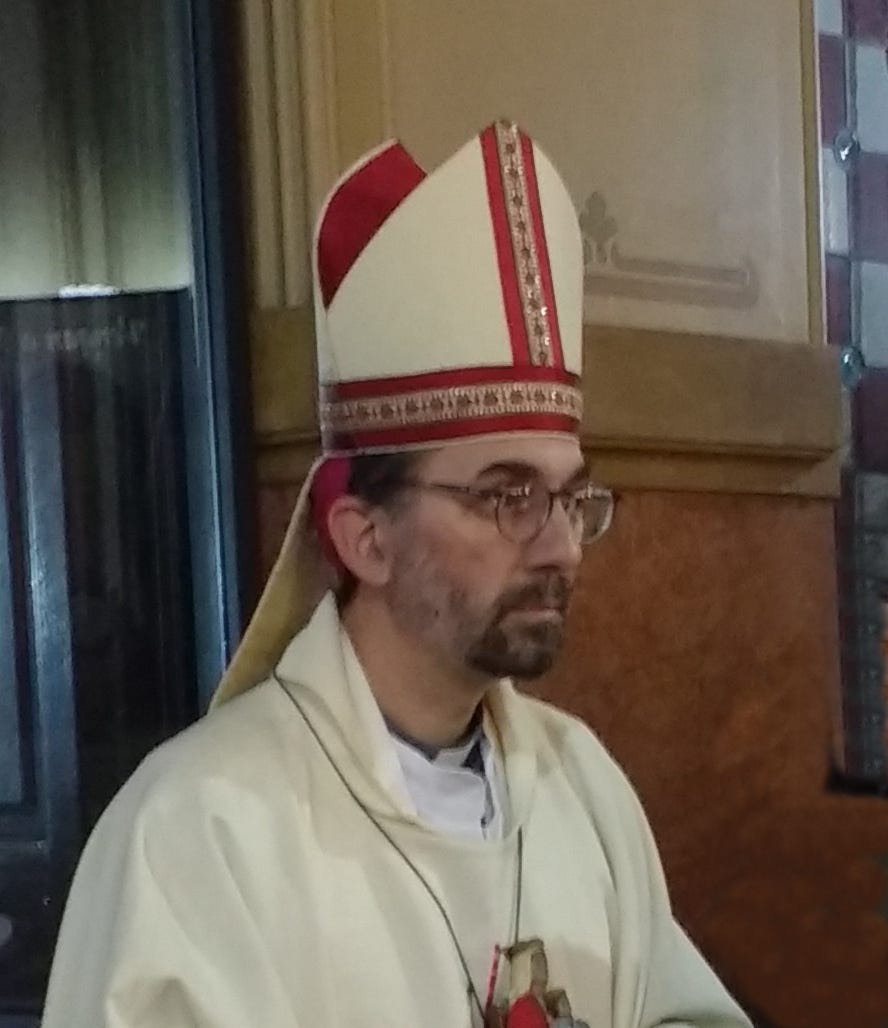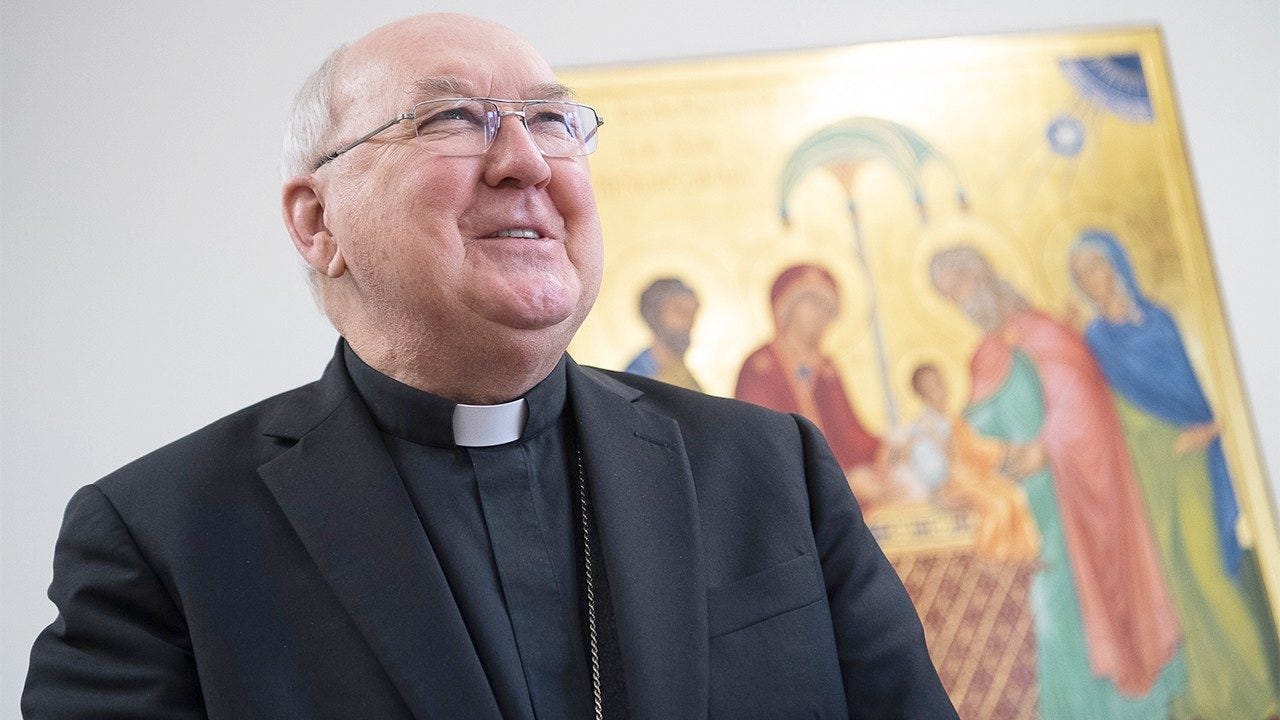Happy Friday friends,
And to all those of you in or making your way here to Washington for the March for Life today, I hope you wore your thermals. For those of you at home, when you see images today of families with young children out there, bear in mind that it’s due to be -8ºc in the District today.
We have a lot of great stuff to go along with today’s march and the cause of defending the dignity of all human life, but before we get to that, let’s talk about those committed to offending it, every chance they get.
Last night, as pilgrims gathered in the Basilica of the National Shrine of the Immaculate Conception for a vigil for life, activists from the group “Catholics for Choice” turned up to project pro-abortion slogans on to the basilica’s bell tower.

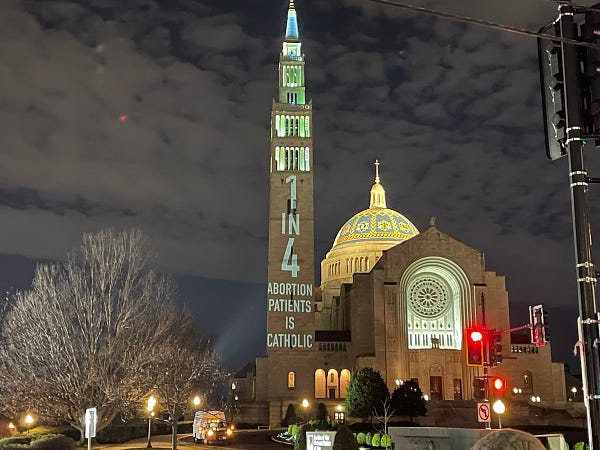
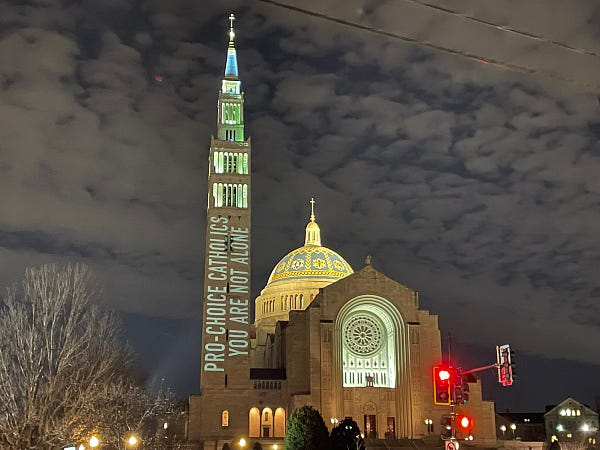
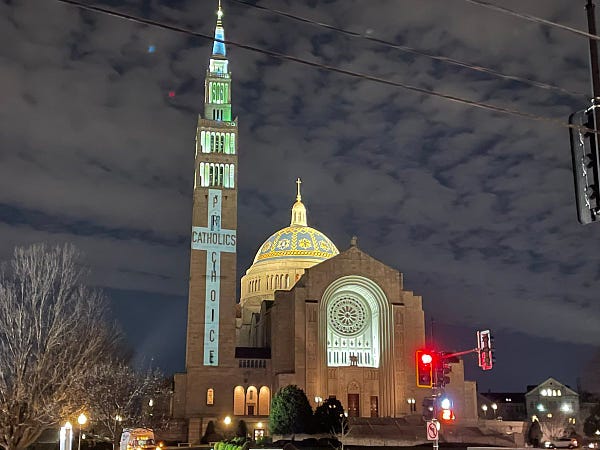
“Catholics for Choice”, it need hardly be said, is not a Catholic group at all, nor has it any moral or canonical right to assume the name “Catholic.” It’s a political action group which spends its time pumping out misinformation on Church teaching across a range of issues, not just abortion.
The response from the Church to the stunt was unequivocal. Really, unambiguously direct.
This morning, Cardinal Wilton Gregory of Washington said that “the true voice of the Church was only to be found within the Basilica of the National Shrine of the Immaculate Conception last evening. There, people prayed and offered the Eucharist asking God to restore a true reverence for all human life.”
“Those whose antics projected words on the outside of the church building demonstrated by those pranks that they really are external to the Church, and they did so at night — John 13:30.”
John 13:30, to save you looking it up, is the verse in which Judas receives Communion at the last supper before departing into the darkness to betray Christ: “So he took the morsel and left at once. And it was night.”
That’s who Cardinal Wilton Gregory says the Catholics for Choice are. As I say, unambiguous.
“It has no membership, and clearly does not speak for the faithful. It is funded by powerful private foundations to promote abortion as a method of population control.”
The group’s latest stunt is unsurprising, indeed perhaps the most surprising thing about it is that it took them this many years to come up with the idea— you’d expect more creativity from an organization paying its top officer north of a quarter of a million dollars. But it’s no less offensive for that. Indeed, the offense is the point.
This is not a clutch of quietly conflicted individuals who lament the reality of abortion but, in a morally misguided way, wonder if ending the perceived causes of legal abortion shouldn’t come before recriminalizing the act itself. Such people ask questions, yes; express empathy, sure; oppose the demonization of women who seek abortions, of course.
But that’s not who we are talking about.
This is a group so dedicated to promoting legal abortion on its own terms and as a good itself, and so viscerally opposed to the Church it was created to subvert, that it turns up to the mother church of American Catholicism to broadcast its mockery of the faith and the dedication of people attending a prayer vigil across the side of the building.
That’s commitment to the culture of death. You can’t say they’re not earning those 30 pieces of silver, and Cardinal Gregory wasn’t shy about suggesting that they have.
—
Happy Life Day
While thousands of faithful families are out in the cold today, not everyone who wants to help advance the cause of human dignity and life is out on the streets of Washington - some can’t be.
The nuns pray, of course, but they have also started a letter writing campaign to pharmaceutical companies, asking them to eliminate the use of fetal cell line testing and all connection to abortion in their work.
I don’t know what immediate results that will yield, but if I got a letter from a cloistered nun telling me that she was reaching out from her life of silent reflection to encourage me to make better choices, it would give me pause.
You can read our interview with the nuns’ prioress, Mother Mary Elizabeth Kloss, here.
For many of the people out in Washington today, this isn’t their first March for Life nor will it be their last. But many do hope a favorable result at the Supreme Court this year will mean it’s the last time they mark the result of Roe v Wade as the law of the land.
In addition to being a California bishop (and a canon lawyer - always a good sign), Vann is the son of a nurse and worked as a medical technician before becoming a priest. His connections to the pro-life cause run through his whole life, and he’s helped to grow some interesting projects over the years.
For Vann, caring for the whole person is at the heart of pro-life work: fighting to end evils like legal abortion and so-called “medicinal suicide” and the circumstances of desperation and isolation that drive people towards them in the first place.
Continuing to look ahead to what’s next for the pro-life fight to end abortion, today our own Brendan Hodge took a look at how demographic changes look set to shift the conversation around abortion.
You won’t find this kind of data analysis anywhere else — but it’s key to understanding the future of the pro-life movement, especially if that future will need to be successful in restricting abortion in 50 United States. Read up.
In other news
Believe it or not, there is a maximum word count for these newsletters, and we still have a lot of news to recap, so I will keep this brief.
Most of you will have seen the news of the independent report into clerical abuse of minors and vulnerable persons in the Archdiocese of Munich, and the references in that report to then-Archbishop Joseph Ratzinger’s handling of cases during his time leading the archdiocese.
We’ve put together an explainer on the report, and what it says about Pope emeritus Benedict XVI, here.
We have also been tracking the latest developments in the still-unfolding constitutional crisis at the Sovereign (?) Military Order of Malta.
With the order’s Grand Chancellor and Pope Francis’ cardinal delegate trading letters on the Vatican’s plans for the order, this story keeps going. It might feel like the ultimate Catholic inside baseball drama, but the issue is actually shaping into a full-blown diplomatic incident with serious repercussions in international law, especially for the Holy See. So don’t miss these reports.
And finally, it would not be a week at The Pillar without some mention of Vatican finances, would it? This week, we looked at the recently released text of an Italian supreme court decision regarding Gianluigi Torzi.
While the popular assumption among the Vatican press pool is that the court’s verdict did further damage to the Vatican prosecutors’ case, I don’t think that’s the case at all,
Not synodality
The Women’s Ordination Conference (WOC) got some attention this week because the group’s “synodal toolkit” has been included on the official resources page for the Synod on Synodality.
Some Catholics have asked why the synod organizers would give quasi-official billing to a group whose entire purpose is to reject a teaching of the Church which has been repeatedly defined as infallible and unchangeable.
Since the announcement of the synod, the synod’s secretariat in Rome has been clear about wanting marginal, even lapsed and dissenting voices to be heard during the global process. As I have said before, if the purpose of giving these voices a hearing is for the Church to then better engage them with the message of the Gospel, that’s great.
What makes the WOC toolkit different from other controversial inclusions, at least to me, is how it encourages its members to engage in the synodal process. Most interestingly, the WOC say they are committed to participating in the synod for the promotion of their views “without interference from the bishops,” and offer a range of ways for people to outmaneuver the “censorship” of the local hierarchy.
This is kind of a problem.
A synod is a place where a range of voices can and should be heard. But the very concept of a synod, as defined by the Church, is that it takes place with, through, and under the authority of the hierarchy of the bishops. Setting out to circumvent the moderating role of the diocesan bishops is, by definition, a break with the authentic synodal process.
Understood this way, the WOC’s toolkit becomes less a manual for participation and more a kind of explicit saboteur’s handbook.
The synod secretariat has already taken flack for posting links to groups opposed to Church teaching, only to take them down, take more flack, and put them back up. I don’t imagine they will be inclined to relive that cycle because of the WOC’s toolkit.
But they should consider that many Catholics are skeptical of their process because, while a clear-eyed invitation for everyone to participate is the aim of the synod, organizers are perceived to be naively wheeling in wooden horses, with little regard for what’s lurking inside.
The risk isn’t that the Church or her teaching will be brought down; they are founded on firmer ground than Troy. The worry is that groups like the WOC will bring the entire synod into chaos and disrepute, making it harder for Catholics, at all levels of the Church, to trust the synodal process in the future.
Sorry about this
Last week I mentioned how grateful we are for the support of our subscribers, and really, we mean it. Seriously, thank you.
But we learned something this week that we want to draw to your attention.
These last few weeks have been the start of our first round of subscription renewals, And we discovered that a number of subscriptions to The Pillar weren’t renewed because people’s billing or card details have changed since they first subscribed, and have not been updated with us.
This happens, and most of the time you notice it because you’re suddenly locked out of the thing you thought you’re paying for. But since we are trying to keep our news free to read, if this happened to you here at The Pillar, you might never notice.
We’ve contacted a number of people in this situation who said they wanted to be ongoing subscribers, and just had forgotten about updating their credit card info.
Anyway, we understand when we lose a subscriber because financial times are tough - and we want you to keep reading.
And we get it when people write to say they are cancelling because they think we’re too liberal or too conservative or otherwise just not their brand of smokes.
But losing subscribers, who want to keep subscribing, because credit card details changed? Well, that stings like turpentine on your nethers, as my sainted Grandma used to say.
So, and I’m sorry for the bother, but if this might be you, would you please consider updating your subscriber details? Believe me, it makes a difference to us. If you’re not sure how, you can email us and we’ll walk you through it.
Thanks. Again.
See you next week,
Ed. Condon
Editor
The Pillar



